(关键词:山西阳泉;娘子关镇;下董寨;元宵节;社火)
The Lantern Festival at Xiadongzhai
By Dong Jirong
(© ChinaCulture.org)

The beating of drums and gongs resonate in the sky; horses with riders gallop single file along a narrow and stone-paved street, stirring up clouds of dust; people flanked on both sides of the street and on the roofs hold their breaths as the high-spirited riders howl along with their horses in a stunt-like manner.
It’s neither a battlefield, nor a circus show. It’s horse-riding performance, the climax of the Lantern Festival celebrations at Xiadongzhai, an age-old mountainous village in Niangziguan Town, Yangquan City, Shanxi Province.
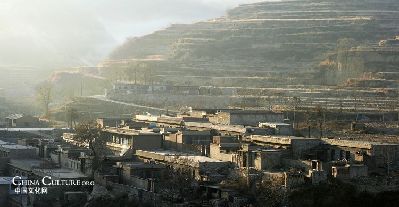
Nestled in the mountains of Taihang, the village, with a population of around 1,000, has for hundreds of years developed the Lantern Festival which falls on the 15th day of the first lunar month. The festivities include “selecting two ‘Lantern Officials'”,“enjoying lanterns”, horse riding, Shehuo show (kind of martial arts performance with characters and plots rooted in Chinese classic military novels), fireworks, local opera shows, and performance of Bayin ensemble (an amateur orchestra made up of local senior farmer musicians).
Most of these celebrations are held along a less-than-3-meter-wide and 450-meter-long stone-paved street, which is the business and culture center of the village. From newborns to graybeards, almost everyone in the village is passionate about the annual Lantern Festival carnival, in the hopes of driving away evil spirits and bringing good luck. “All-inclusive and all-participating” are, without exaggeration, the right words to describe the village’s biggest annual gala.
Preparing for the festivities
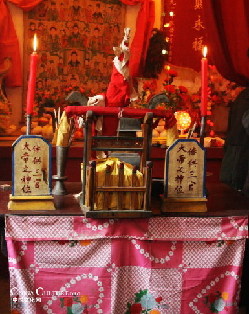
the place where the “three gods”are housed
Preparation work for the Lantern Festival celebration begins about two weeks before the event. The first priority is to select “Daguan” and “Erguan,” two “Lantern Officials” who are representatives of the “three gods”in charge of heaven, earth, and water. The “three gods”, referring to Yao, Shun and Yu, the three legendary Chinese ancestors who are believed to protect villagers from bad luck, and as the custom goes, they change their residences every year, going from one family to another. Senior and respected villagers select Daguan and Erguan, and their mission is to ensure a merry and festive Lantern Festival. Despite the fake “officialdom” and less-than-a-month term, selection criterions are demanding in terms of social status, leadership, wealth and family size. Those who are wealthy, generous and have a big family are more likely to be selected. Throughout time, the duties of Daguan and Erguan have also evolved into modern times; nowadays Daguan is always called chairman or director of the Lantern Festival celebration committee, and Erguan vice chairman.
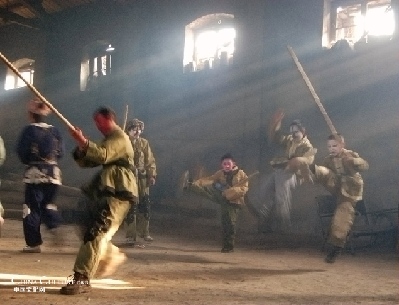
Shehuo players are rehearsing.
In addition to selecting the Lantern Officials, other preparation work is under way. Shehuo players are busy practicing. Performers of the local Jin Opera, Yang’er dance, and stilts, and gong and drum players are constantly rehearsing. Members of the celebration committee decorate the only street in the village with several pole-supported Pailous, archway-shaped structures covered with millet straw, evergreen pine and cypress branches. Among all the Pailous the most eye-catching one lies in the middle of the street, with four standing poles erected across the street forming three gates.
Colorful paper banners written with auspicious characters are hung across the street. These days every family buys a lantern to hang on their gates. But years ago, they used to make lanterns by hand with kaoliang haulms and paper, and some with dexterous skills even created lanterns in the shapes of watermelons or animals. Fireworks experts in the village spend days making traditional crackers, of which the most amazing one is “Laogan,” the several dozens of meters high, multi-layered super fireworks. The making of “Laogan” involves sophisticated craftsmanship, with every layer showing different visual effects and fire shapes such as “crane laying eggs”, “rat picking grapes”, and “monkey stirring up a hornet’s nest”.
Lantern Officials “take office”
Daguan’s and Erguan’s jobs begin on the 14th day of the first lunar month. Accompanied by family members and villagers-acting subordinates, they ride horses to the family where the “three gods” are housed that year to accept the “official” flag and seal at a ceremonious ritual, thus becoming legitimate representatives of the gods.
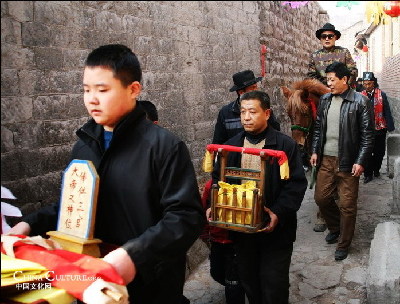
Accepting the “official”flag and seal

the “official”seal
That afternoon, folk performances such as Yang’er dance and stilts take to the street, ushering in the annual Lantern Festival show. When night falls, more exciting programs featuring Erguan “checking lantern-hanging” and “hearing civil cases” unfold.
The gong is struck three times to direct the whole process. After the first gong is heard, every family hangs lanterns on their gates. When the gong is hit again, every lantern is lighted up, illuminating the street and making it as bright as daytime. Villagers now swarm out onto the street, appreciating different-styled lanterns and waiting for Erguan’s official team to appear. When the gong sounds for a third time, Erguan, the leading actor that night, is dressed in an early 20th century long gown and wears a pair of sunglasses and a hat. He comes from the eastern end of the street, together with his male family members and “subordinates”, all riding horses. Their task is to check whether every house gate is lit with a lantern and “hear” possible “civil cases”. As the group approaches, one can hear Erguan say: “Well, this lantern is quite unique and beautiful,” or “that one is far from good.” All of a sudden, a voice from the audience says loudly: “I have grievance and hope you can do justice for me!” Then Erguan orders the team to stop and asks the man to present his case. The man complains that he’s over 70-years-old, but his two sons refuse to feed him. Erguan then summons the man’s “sons” to come to him and demands to know why. The two “sons” defend themselves with weak reasons. Erguan brushes away their excuses and orders that they support their “father” either by themselves or hiring a nursing maid. The two “sons” accept the verdict and the “father” expresses his gratefulness. At this, the audience standing around applauds. Erguan’s team keeps moving. They’ll be stopped several times along the street to hear “cases” which are fictional but closely related to the villagers’ daily life, sometimes with hilarious lines.
After “checking lanterns” and “hearing cases”, traditional fireworks made by local experts are set off at Dengsanlan, one of the two public squares in the village. The loud banging, cracking, and sizzling, together with people’s shouts in an excited manner, fill every corner of the square. More than crackers, “iron fire” is sometimes “ignited”. It is basically a ladle filled with molten iron that spills drops of hot red liquid iron, producing a firework-like effect.
When the last of the fireworks are lit, a haystack that is 10 meters in diameter is piled up in the middle of the square and then lit, creating a giant bonfire. People gather around it to keep warm from the cold night, and, according to custom, receive good luck from it.
All the day’s programs including “checking lantern-hanging” and “hearing civil cases”, fireworks show and burning “auspicious” hay are repeated the following night, only on an even bigger scale and to bigger crowds.
Praying for good luck at the Lantern Festival
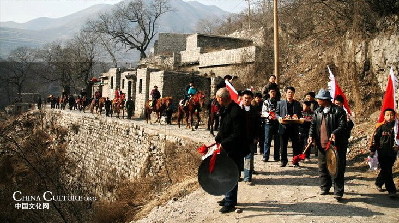
On the morning of the 15th day of the first lunar month,
Daguan and Erguan are on their way to worship gods in the village.
On the morning of the 15th day of the first lunar month, villagers pay visits to the family accommodating the “three gods”, bringing incense with them to pray for a happy new year.
This is a most important day for children. On every lantern festival before a child turns 12, they come to the front of the shrine of the “three gods” with their parents early in the morning and have two coins with holes in the middle strung together, which is used as talisman to keep the evil spirits away. It’s believed every child in the village is, on the first 15th day of the first lunar month after his or her birth, trusted to the “three gods” to grow up healthy and safe, and the two-coin talisman is the symbol of the gods’ protecting power. When the child turns 12, he or she is taken to the “three gods” with dozens of coin strings made in past years and a key is inserted into a lock. A senior person who presides over the ceremony uses the key to unlock the lock, indicating the child has grown up and is embarking on a journey to seek his or her own future.
All day long, the village glows with high spirits. In addition to folk street performances, Jin Opera is staged in a half-a-century-old theater situated in the middle of the street. Xiadongzhai Jin Opera Troupe, famed for its outstanding performing skills, used to be a household name in neighboring counties. Members of the troupe are all locals in the village. Their roles are all-inclusive, even including a cross-dressing male actor. The troupe has all the costumes and props that one expects to find; they have so many repertoires that in a half-a-month-long performance season they will not repeat any of them. Unfortunately, with modern entertainment getting more airtime, the troupe finds itself withering and audiences shrinking.
On the night of the Lantern Festival, members of the Jin Opera troupe and Bayin music ensemble assemble in front of the shrine of the “three gods” to perform throughout the evening.
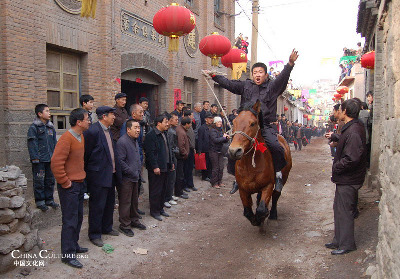
Horseback riding and Shehuo show
Horseback riding on the 16th day of the first lunar month is the most thrilling and impressive event of the whole Lantern Festival celebration.
Handed down from generation to generation for hundreds of years, “horse running” is held annually along the street in the village. All the riders are locals who till the farmlands and have no equestrian training, while the horses are raised by local families and used to plough land during the busy farming period. In recent years, the number of local horses is declining, so the village has begun renting horses from neighboring Hebei Province.
Every 16th day of the first lunar month (February 10 this year), villagers cover the slippery stone street with coal ash to prevent slipping, and pull out seven to 10 horses for an upcoming performance. Soon after breakfast, young and brave men gather at Guandaokou, a square near the east end of the street, waiting for a ride, and spectators swarm into Xiadongzhai from neighboring towns and even faraway places. It is the perfect arena to show off one’s riding skills, as they must get on and ride the horses bareback. Some experienced riders even let go of the horses’ manes and loosen their legs’ grip around the horses’ backs. More than courage and experience, all the riders believe the “three gods” will render them good luck.
After the warm-up, the horses break out into a sweat and need to rest. But before their reappearance for the official performance, a group of young boys who wear costumes and make up their face to look like monkeys parade in single file. A “monkey king” sits on a thin pole and imitates expressions and actions, and the other monkeys follow. He amuses audience by scratching his head like a monkey, winking at the crowd, snatch a spectator’s cigarette and putting it into his own mouth, grabbing someone’s hat to put on his head, or jumping down to climb up the pole. This comical interval is probably used to ease the tense atmosphere of horse running.
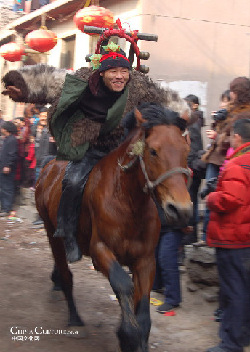
A rider wearing a fur-lined jacket inside-out
As people are still laughing at the clownish performance of the “monkey king,” a gong thunders, ushering in the final rounds of horse running, which is quite different from the previous ones. Only seven riders are allowed to participate and they are clad in tight short clothes and head scarf, with the leader wearing a fur-lined jacket inside-out, a bronze-bell decorated wooden frame and an official letter on his back. They are dressed up to be like messenger riders in ancient China who raced day and night to deliver urgent letters. The inside-out fur-lined jacket kept the rider warm all the way, and the bronze bells dotted on the wood frame would warn those who stood in his way. Three rounds of the seven formally-dressed riders’ horse running pushed the movement to a climax.
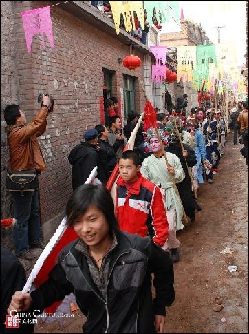
A running parade of heavily painted Shehuo performers
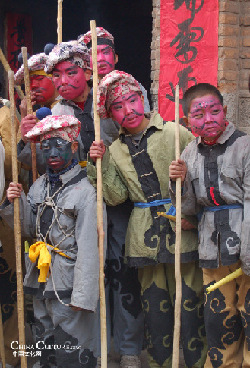
A running parade of heavily painted Shehuo performers
When horse running concludes, drums are beaten to herald the approach of the Shehuo shows. From the western end of the street, one can see a running parade of heavily painted Shehuo performers, wearing ancient military costumes and weapons in hands, approaching. They run three rounds along the street, with the first round paying worship to the “three gods”, the second to Daguan and Erguan. In the third round, they join in the team of “welcoming fireworks”, a ceremony in which villagers, led by Duguan and Erguan, carry a huge homemade firework to Guandaokou. Afterwards, the firework is placed on sacrificial table and then ignited, its lingering sound piercing the sky and scaring both the demons and bad luck away. Accompanying the crackling firework is music played by the Bayin ensemble. In this concert, Daguan and Erguan get seated at a temporary podium and deliver a welcome speech to the standing audience.
Ceremony of“welcoming fireworks”
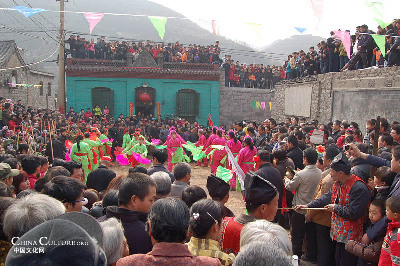
Ceremony of“welcoming fireworks.”
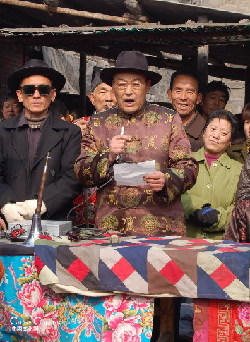
Erguan is delivering a speech.
Now it’s time for the Shehuo show. Based on well-known stories selected from classical Chinese novels, such as The Three Kingdoms and The Outlaws in the Marsh, the Xiadongzhai Shehuo show consists of five sections, and in each section, two confronting parties fight with each other using fists, sticks, swords, and other weapons. Wearing professional attire and carrying props, every movement of the Shehuo players is nimble and neat, continuously winning thunderous applause. All of the Shehuo players are villagers of Xiadongzhai; most of them are teenagers but there are also men in their 30s or even 40s. The Shehuo team first performs at Guandaokou and then moves to Dengsanlan for more wonderful shows. With the conclusion of the Shehuo show, the Lantern Festival celebration in the village comes to an end.
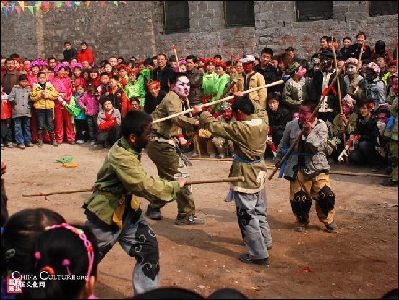
Shehuo team is performing.
It’s believed that people become too relaxed in the first lunar month and consequently, evil spirits will come in. To drive them away, a couple of young and rugged men carry a large drum through the whole village from one family to another. Wherever they arrive, they beat the drum loudly in the hopes of dispersing the evil spirits, and the host will thank them by giving them a bottle of wine or a pack of cigarettes as gifts.
On the 18th day of the first lunar month, a ritual is held to move the shrine of the “three gods” to another family. A parade of performers, including those of Shehuo, Yang’er dance, Jin Opera, and Bayin ensemble, as well as Lantern Festival celebration committee members, led by Duguan and Erguan carry colorful flags, lanterns, and all kinds of sacred items. When the “three gods” arrive at the new accommodating family, Duguan and Erguan kowtow to return the “official” flag and seal, signaling their leaving office. In the year of 2007, the “three gods” eventually settled down in Damiao, the oldest temple in the village, terminating their history with no fixed abode.
More information
How to go there:
Option 1
Step 1. Fly to Taiyuan City, Shanxi Province
Step 2. Take bus/train from Taiyuan to Yangquan City, about 1.5-2 hours;
Step 3. Take bus from Yuanquan to Niangziguan Town, and get off at Xiadongzhai stop, about 1 hour.
Option 2
Step 1. Take train to Yangquan, Shanxi Province.
Step 2. Take bus from Yangquan to Niangziguan, and get off at the stop of Xiadongzhai, about 1 hour.
When to go there and what to see:
The 14th day of the first lunar month (February 8 this year): Street performances in the afternoon; Erguan “checking lantern-hanging” and “hearing civil cases;” fireworks;
The 15th day of the first lunar month (February 9 this year): Worshipping the “three-gods”; Street performances; Daguan “checking lantern-hanging” and “hearing civil cases”; fireworks;
The 16th day of the first lunar month (February 10 this year and most exciting day): Horse running; Shehuo show; fireworks.
By Dong Jirong
附件: